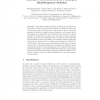Free Online Productivity Tools
i2Speak
i2Symbol
i2OCR
iTex2Img
iWeb2Print
iWeb2Shot
i2Type
iPdf2Split
iPdf2Merge
i2Bopomofo
i2Arabic
i2Style
i2Image
i2PDF
iLatex2Rtf
Sci2ools
103
click to vote
BILDMED
2007
2007
Bayesian Vessel Extraction for Planning of Radiofrequency-Ablation
The software-assisted planning of radiofrequency-ablation of liver tumors calls for robust and fast methods to segment the tumor and surrounding vascular structures from clinical data to allow a numerical estimation, whether a complete thermal destruction of the tumor is feasible taking the cooling effect of the vessels into account. As the clinical workflow in radiofrequency-ablation does not allow for time consuming planning procedures, the implementation of robust and fast segmentation algorithms is critical in building a streamlined software application tailored to the clinical needs. To suppress typical artifacts in clinical CT or MRT data - like inhomogeneous background density due to the imaging procedure - a Bayesian background compensation is developed, which subsequently allows a robust segmentation of the vessels by fast threshold based algorithms. The presented Bayesian background compensation has proven to handle a wide range of image perturbances in MRT and CT data and ...
Algorithms | Bayesian Background Compensation | BILDMED 2007 | Clinical Data | Fast Segmentation Algorithms |
| Added | 29 Oct 2010 |
| Updated | 29 Oct 2010 |
| Type | Conference |
| Year | 2007 |
| Where | BILDMED |
| Authors | Stephan Zidowitz, Johann Drexl, Tim Kröger, Tobias Preusser, Felix Ritter, Andreas Weihusen, Heinz-Otto Peitgen |
Comments (0)

